Daily Vocabulary Words: List of Daily Used Words in Leading International Newspapers
Hi there. Welcome to this special section @ Wordpandit.
Our endeavour here is very simple: to highlight important daily vocabulary words, which you would come across in leading newspapers in the country. We have included the following newspapers in our selection:
• The New York Times
• The Washington Post
• Scientific American
• BBC
• The Guardian
• Psychology Today
• Wall Street Journal
• The Economist
We are putting in extensive work for developing your vocabulary. All you have got to do is be regular with this section and check out this post on a daily basis. This is your repository of words that are commonly used and essentially, we are posting a list of daily used words. Hence, this has significant practical application as it teaches you words that are used commonly in leading publications mentioned above.
Visit the website daily to learn words from leading international newspapers.
WORD-1: Barely
CONTEXT: It’s 5am on Saturday morning and I’m barely awake, denied the snooze button, attempting to read 2016’s A Gentleman in Moscow by American novelist Amor Towles by bedside light.
SOURCE: The Guardian
EXPLANATORY PARAGRAPH: Barely is like when you just, just manage to do something. Imagine you’re running to catch a bus and you get on it just as the doors are closing. That’s barely making it!
MEANING: Only just; hardly; by the smallest amount (adverb).
PRONUNCIATION: BAIR-lee
SYNONYMS: just, scarcely, hardly, narrowly, slightly, only just, minimally
USAGE EXAMPLES:
1. She barely passed the exam.
2. He arrived barely on time.
3. There was barely enough food for everyone.
4. I could barely see in the dark.
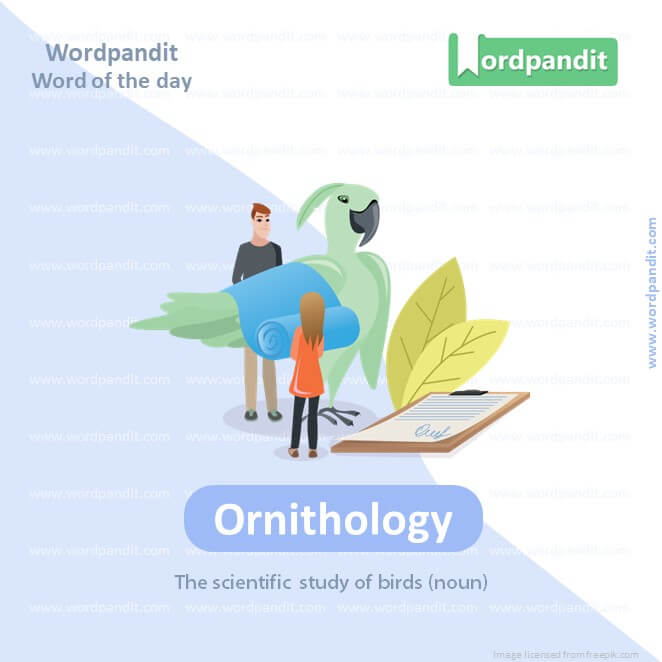
WORD-2: Ornithology
CONTEXT: Why am I reading this pre-sunrise tale of suspected post-first world war anti-communism/ornithology? Because I’m recreating Gregg Wallace’s perfect Saturday, obviously.
SOURCE: The Guardian
EXPLANATORY PARAGRAPH: Ornithology is the study of birds. It’s like being a bird detective, looking closely at birds to learn about how they live, what they eat, and where they travel.
MEANING: The scientific study of birds (noun).
PRONUNCIATION: or-ni-THOL-uh-jee
SYNONYMS: bird science, avian biology, bird study, avian studies, avian research
USAGE EXAMPLES:
1. She is studying ornithology at university.
2. Ornithology helps us understand bird behavior.
3. They published their findings in an ornithology journal.
4. His passion for ornithology started at a young age.
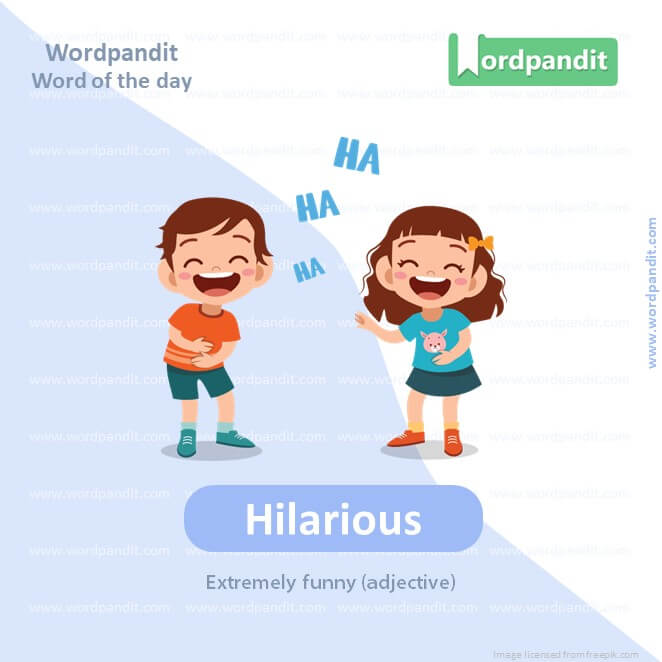
WORD-3: Hilarious
CONTEXT: I found him charming, hilarious and endearing. (“Mate, please. I’m Gregg Wallace.)
SOURCE: The Guardian
EXPLANATORY PARAGRAPH: Hilarious is when something is super funny. Think about when you watch a funny cartoon and you laugh so much that your belly hurts. That’s what hilarious means!
MEANING: Extremely funny (adjective).
PRONUNCIATION: hi-LAIR-ee-us
SYNONYMS: amusing, funny, humorous, laughable, comical, entertaining, side-splitting
USAGE EXAMPLES:
1. The movie was absolutely hilarious.
2. He told a hilarious joke.
3. They found the situation hilarious.
4. Her story was so hilarious that everyone laughed.
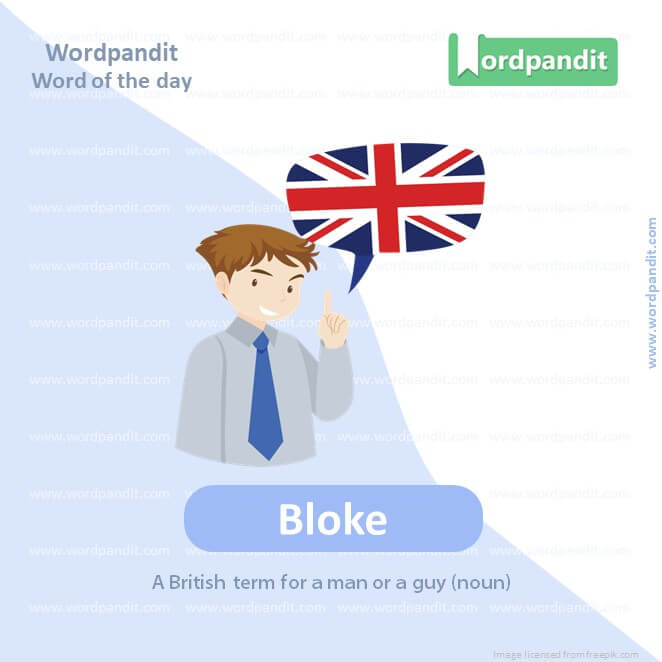
WORD-4: Bloke
CONTEXT: (“Mate, please. I’m Gregg Wallace. I’m the bald fat bloke off MasterChef.”)
SOURCE: The Guardian
EXPLANATORY PARAGRAPH: Bloke is a word that people in some places like the UK use to talk about a man. Think about if you have a friend who’s a boy and you say, “He’s a nice guy.” Bloke is another way to say “guy.”
MEANING: A British term for a man or a guy (noun).
PRONUNCIATION: BLOHK
SYNONYMS: man, guy, chap, fellow, dude, gent, male
USAGE EXAMPLES:
1. He’s a really nice bloke.
2. That bloke over there is my brother.
3. I met a bloke at the park today.
4. The bloke at the store was very helpful.
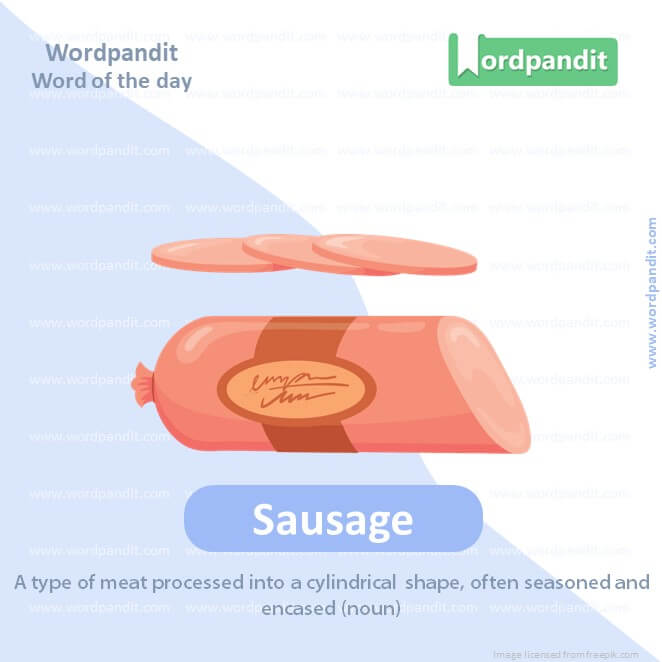
WORD-5: Sausage
CONTEXT: If I head to my local Harvester and Heritage his, we can form an intra-Harvester Gregg Wallace spy ring and beat the paparazzi to a photo of the great man forking a sausage.
SOURCE: The Guardian
EXPLANATORY PARAGRAPH: Sausage is a type of food made by stuffing ground meat and spices into a tube shape. It’s like when you take meat, add some yummy spices, and then cook it to eat with your breakfast or put on a pizza.
MEANING: A type of meat processed into a cylindrical shape, often seasoned and encased (noun).
PRONUNCIATION: SAW-sij
SYNONYMS: link, bratwurst, kielbasa, frankfurter, chorizo, salami, pepperoni
USAGE EXAMPLES:
1. They grilled sausages for the barbecue.
2. Breakfast included eggs and sausage.
3. She added slices of sausage to the pizza.
4. The sausage was spicy and flavorful.
WORD-6: Denigrating
CONTEXT: I’ve brought my kids and dad, and Dad is denigrating Wallace hard. “How can this possibly be his favourite breakfast?” he keeps saying, poking his scrambled eggs.
SOURCE: The Guardian
EXPLANATORY PARAGRAPH: Denigrating is when someone says mean or belittling things about someone else. It’s like if someone tried to make your drawing look bad by saying it wasn’t good, even when you worked hard on it.
MEANING: Criticizing unfairly; belittling (verb).
PRONUNCIATION: DEN-i-gray-ting
SYNONYMS: belittling, disparaging, demeaning, degrading, defaming, slandering, vilifying
USAGE EXAMPLES:
1. He was denigrating her work in front of the whole team.
2. Denigrating comments about colleagues are unacceptable.
3. The article was accused of denigrating the achievements of the team.
4. She felt hurt by his denigrating remarks.
WORD-7: Dime
CONTEXT: She said no, but did tell me the name of his favourite pub, so perhaps that will be the next stage of my weird quest to stalk Gregg Wallace on the Guardian’s dime.
SOURCE: The Guardian
EXPLANATORY PARAGRAPH: A dime is a small coin worth ten cents. Imagine you have a piggy bank and you’re putting in coins; a dime is one of those tiny silver ones that’s not worth as much as a quarter but is still important.
MEANING: A coin of the United States and Canada worth ten cents (noun).
PRONUNCIATION: DYM
SYNONYMS: ten-cent piece, coin, money, small change, currency, silver, nickel
USAGE EXAMPLES:
1. He found a dime on the ground.
2. It costs a dime to use the phone.
3. She saved every dime for her vacation.
4. The machine accepts quarters, nickels, and dimes.
WORD-8: Pupils
CONTEXT: A ludicrously stratified university system that sorts students with three As and three Bs into different institutions to study the same subject allows some universities to point to the high earnings their graduates go on to achieve as a measure of quality, when that will be largely because of the fact that they cream off the highest-achieving pupils, who disproportionately come from the most affluent backgrounds.
SOURCE: The Guardian
EXPLANATORY PARAGRAPH: Pupils are the kids who go to school to learn. Just like you go to school and have classmates, you and your classmates are pupils because you’re there to learn new things from your teachers.
MEANING: Students who are taught in schools (noun).
PRONUNCIATION: PYOO-puhls
SYNONYMS: students, learners, scholars, attendees, disciples, schoolchildren, classmates
USAGE EXAMPLES:
1. The teacher asked the pupils to open their books.
2. The school has over 500 pupils.
3. Pupils were excited about the field trip.
4. Awards were given to outstanding pupils.
WORD-9: Ludicrously
CONTEXT: A ludicrously stratified university system that sorts students with three As and three Bs into different institutions to study the same subject allows some universities to point to the high earnings their graduates go on to achieve as a measure of quality, when that will be largely because of the fact that they cream off the highest-achieving pupils, who disproportionately come from the most affluent backgrounds.
SOURCE: The Guardian
EXPLANATORY PARAGRAPH: Ludicrously means something is so silly or funny that it’s hard to believe. Like if someone wore a clown suit to a regular school day, you might think it’s ludicrously funny.
MEANING: In a way that is so foolish, unreasonable, or out of place that it is amusing (adverb).
PRONUNCIATION: LOO-di-kruhs-lee
SYNONYMS: absurdly, ridiculously, laughably, preposterously, comically, foolishly, insanely
USAGE EXAMPLES:
1. He was ludicrously dressed for the formal event.
2. The price they asked for the house was ludicrously high.
3. She found the idea ludicrously simple.
4. The movie was ludicrously unrealistic.
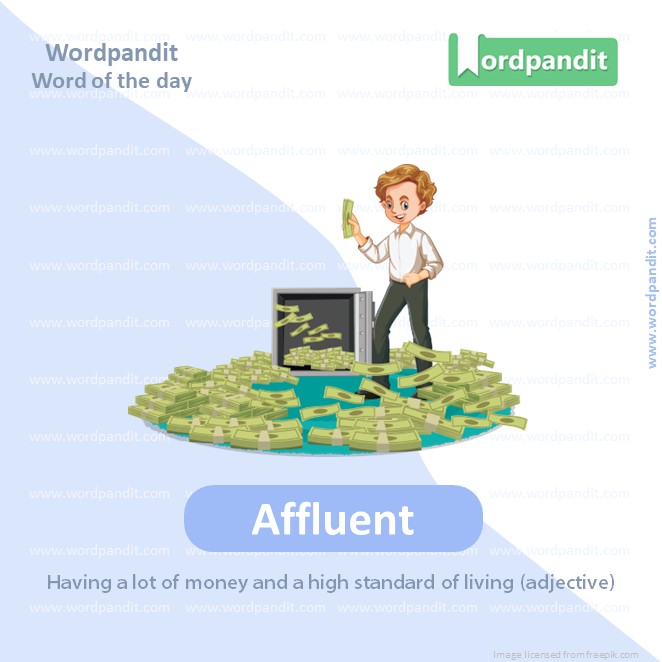
WORD-10: Affluent
CONTEXT: A ludicrously stratified university system that sorts students with three As and three Bs into different institutions to study the same subject allows some universities to point to the high earnings their graduates go on to achieve as a measure of quality, when that will be largely because of the fact that they cream off the highest-achieving pupils, who disproportionately come from the most affluent backgrounds.
SOURCE: The Guardian
EXPLANATORY PARAGRAPH: Affluent means having a lot of money or things. Imagine someone who can buy lots of toys whenever they want because they have plenty of money; that person is affluent.
MEANING: Having a lot of money and a high standard of living (adjective).
PRONUNCIATION: AF-loo-uhnt
SYNONYMS: wealthy, rich, prosperous, well-off, well-to-do, opulent, moneyed
USAGE EXAMPLES:
1. They live in an affluent neighborhood.
2. Her family is quite affluent.
3. The study focused on the habits of affluent consumers.
4. He donated a large sum of money to charity, showing his affluent status.
vocabulary 10 sentence
In the fascinating world of language learning, one of the most vital and effective methods is the ‘vocabulary 10 sentence’ strategy. An incredibly valuable tool, the ‘vocabulary 10 sentence’ approach assists language learners in an immersive, organic, and contextual manner often used in learning environments.
The ‘vocabulary 10 sentence’ strategy is essentially a practice where learners incorporate a new vocabulary word into 10 different sentences. Doing this repeatedly creates a thorough understanding of the word’s meanings, usage, context, and nuances. It is a learning technique that imitates the natural language acquisition process.
In a ‘vocabulary 10 sentence’ exercise, learners begin with choosing a new word, then crafting ten unique sentences involving that word. While this can seem challenging initially, it rapidly enhances one’s cache of usable vocabulary. Moreover, it allows learners to grasp a different range of contexts and applications for every new word, encouraging them to experiment with their language skills.
In traditional vocabulary learning methods, words are often learned as standalone entities with rigid definitions. In contrast, the ‘vocabulary 10 sentence’ technique encourages an understanding that words are dynamic and can have different meanings based on the context they are used in. This technique helps remove the constraints of rote memorization and promotes active learning instead.
The ‘vocabulary 10 sentence’ technique can be utilized by language learners at all stages. Setting a daily target for learning new words through this method can significantly speed up language acquisition and understanding.
In conclusion, the ‘vocabulary 10 sentence’ strategy can revolutionize the way you learn new languages. This ingenious approach motivates learners to explore beyond a word’s basic definition, diving into its usage in various contexts. By incorporating the ‘vocabulary 10 sentence’ technique into your daily language learning routine, you will actively participate in your own learning process, making it more effective and enjoyable.











